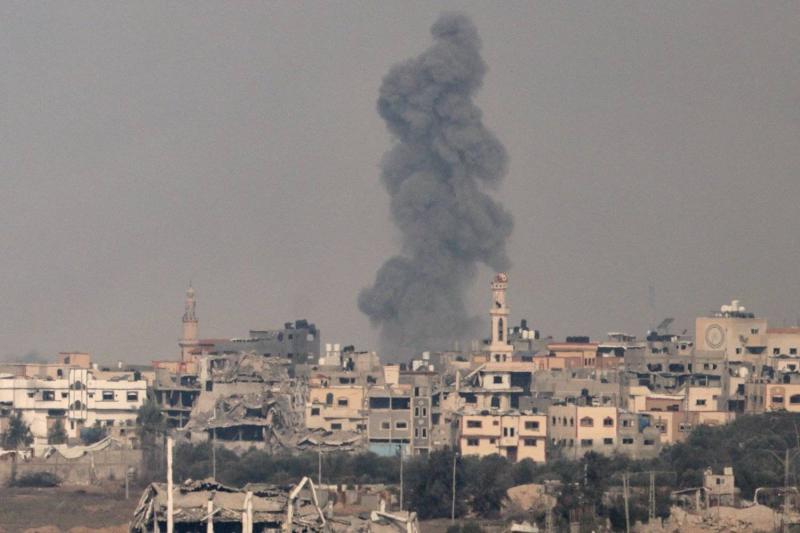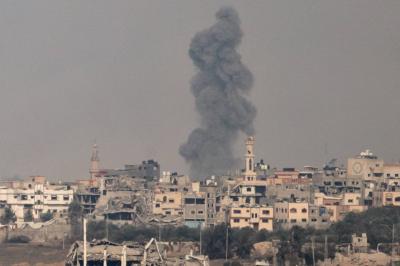Heavy clashes erupted today between Israeli forces and Islamic Resistance Movement (Hamas) militants in the streets of Khan Younis, the second-largest city in Gaza, as the United Nations postponed a vote on an attempt to enhance aid delivery to the Palestinian territory facing a humanitarian disaster. The Israeli campaign to eliminate Hamas fighters has led to the destruction of Gaza and the death of around 20,000 residents, according to the health ministry in the Palestinian territory. It has also resulted in widespread hunger and displacement.
Despite external pressures to avoid civilian casualties, Israeli Prime Minister Benjamin Netanyahu stated that the war would not cease until Hamas releases the remaining 129 hostages held in Gaza and eliminates the Iran-backed group. Meanwhile, a United Nations Security Council vote on initiating aid delivery was again postponed to another day yesterday, continuing discussions to avoid the United States using its veto power for the third time to block action regarding the ongoing two-month war between Israel and Hamas. The 15-member council was initially scheduled to vote on a resolution drafted by the UAE on Monday but has been delayed several times, with diplomats indicating that the UAE and the United States are struggling to agree on language referring to a ceasefire and proposing the establishment of a monitoring mechanism for the UN aid.
When asked if diplomats were nearing an agreement, U.S. Ambassador to the United Nations Linda Thomas-Greenfield told reporters yesterday, "We are trying, we are really trying." The conflict has extended beyond Gaza, reaching areas such as the Red Sea, where Iran-aligned Houthi forces based in Yemen have been attacking commercial ships with missiles and drones, prompting the establishment of a multinational maritime operation to protect trade routes. U.S. Secretary of Defense Lloyd Austin stated in Bahrain that joint naval patrols will be organized in the southern Red Sea and Gulf of Aden, which includes a major global shipping route between the East and West, the Bab el-Mandeb Strait. He added, "This is an international challenge that requires collective action."
The British maritime security company Ambrey reported yesterday it received information about a failed attempt to board a vessel west of the Yemeni coastal city of Aden. Some shipping companies are rerouting their paths around Africa. The Houthis have stated that they will continue to attack commercial vessels in the vital trade route, possibly conducting maritime operations every 12 hours. Houthi official Mohammed Abdel Salam told Reuters that the movement's support for Palestine and the Gaza Strip will continue until the siege ends and food and medicine are allowed in, asserting that the movement targets only Israeli ships or those heading to them.
**Street Fighting**
In Gaza, residents of Khan Younis reported severe clashes today between Hamas fighters and Israeli forces in the center and east of the city. Health officials in Gaza stated that 12 Palestinians were killed in an Israeli strike on a house in the city located in the southern part of the sector. Israel has lost 132 soldiers in the fighting inside Gaza since its invasion of the territory following the attack by Hamas on October 7, which Israel claims resulted in the deaths of 1,200 people and the abduction of 240 hostages. Al-Quds Brigades, the military wing of Islamic Jihad, released a video recording of two Israeli hostages identifying themselves as Gadi Musa and El'ad Katzir. Musa is approximately 79 years old and was captured from a residential community when Hamas launched its attack in southern Israel. Katzir (47 years old) was also captured from a residential community along with his mother, who was released later; reports indicate that his father was killed.
The health ministry in Gaza reported yesterday that 19,667 Palestinians have been killed and 52,586 injured in the war. The United Nations Relief and Works Agency for Palestine Refugees (UNRWA) reported that over 60% of Gaza's infrastructure has been destroyed or damaged, and more than 90% of the population of 2.3 million has been displaced from their homes. Health officials in Gaza indicated that Israeli rockets struck an area south of Rafah yesterday where hundreds of thousands of refugees had gathered in recent weeks, killing at least 20 people and injuring dozens while they slept in their homes.
Residents stated they had to sift through the rubble by hand to find survivors. Mohammed Zaarab, who lost 11 family members in the attack, remarked, "This is a barbaric act." The health ministry reported another strike in the north that resulted in the deaths of 13 people and injuries to around 75 others in the Jabalia refugee camp. Palestinians reported that Israel intensified air and artillery bombardment of Jabalia as darkness fell late yesterday. Israel claims it warns before launching strikes to allow civilians to flee and accuses Hamas fighters of sheltering in residential areas and using hospitals and schools as cover, a claim the movement denies.
Israeli military officials told reporters at a press conference yesterday that the high civilian casualties are the cost of the Israeli campaign to destroy Hamas and the urban warfare strategy used by militants, despite global concerns regarding the immense number of casualties.
**Talks on Aid and Hostages**
Israeli President Isaac Herzog expressed Israel's readiness to engage in another "humanitarian truce" mediated by foreign entities to secure the release of more hostages held by Hamas and to allow increased aid to Gaza.
Bassem Naeem, a Hamas leader based outside Gaza, dismissed the notion of further negotiations on prisoner exchanges while the war continues. A source familiar with diplomatic efforts told Reuters yesterday that the Prime Ministers of Qatar and the heads of American and Israeli intelligence had positive discussions in Warsaw about ways to revive negotiations. The source added that no agreement is expected to be reached soon.




